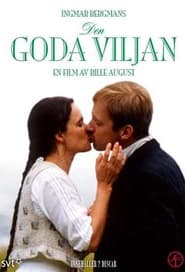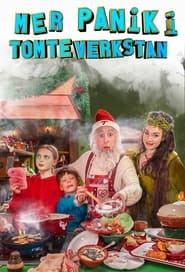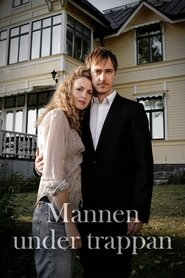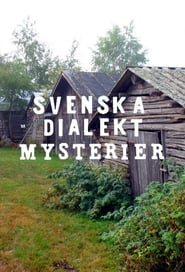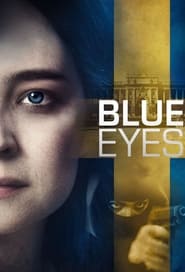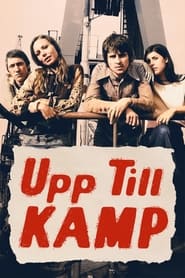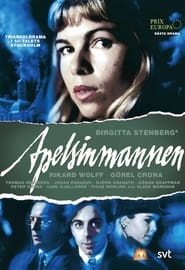Svt1 TV Series - Page 10
-
Tekniskt magasin
1958
Tekniskt magasin
1958
-
The Best Intentions
1991
star 7The story of Ingmar Bergman's parents. How they fell in love, married against the wishes of their families, and had a difficult marriage and life in rural Sweden. Bergman's father was a pastor and poor; his mother from a well to do cultured family. It ends with the birth of Ingmar. -
SK 917 har nettopp landet
1983
star 10Norwegian miniseries. The story takes place in a jumbo jet on a route between Copenhagen and New York. SAS route 917 takes off from Copenhagen Airport with 350 passengers on board. Among the passengers in first class are four Nordic directors of an American cosmetics group. The atmosphere between them is tense. Shortly after departure, a business manager dies of a heart attack. Later on the journey, someone discovers a dead man in the toilet room. A ruthless murderer is on board the plane. -
Värsta språket
0000
star 7Värsta språket was a Swedish television series about the Swedish language. The series, which was hosted by Fredrik Lindström and produced by Karin af Klintberg, was broadcast on SVT during 2002 and 2003. The series discussed issues with the Swedish language in an entertaining way. After two seasons, Fredrik Lindström claimed that the attention from the programme was a burden to him and that he wouldn't host it anymore. The show was therefore put on hiatus. Lindström did however return with another language-related series called Svenska dialektmysterier in 2006. Lindström and af Klintberg were given Stora journalistpriset for the programme. Much of what was mentioned in the show is recorded and can be read in Lindström's two books: Världens dåligaste språk and Jordens smartaste ord. -
Party hos Parnevik
1978
Party hos Parnevik
1978
-
We Got This
2020
star 5.9Struggling from the collapse of his career and a sudden unsurmountable tax debt, American immigrant George English stumbles onto the fact that there is a 50 million SEK reward for solving the murder of Olof Palme. He assembles a crew of misfits to assist him as he begins to imagine that solving this seemingly unsolvable crime of the century could be the answer to all of his problems, but as the deeper they go into the labyrinth the more dangerous their journey becomes. -
Mer panik i tomteverkstan
2021
It is low season in the Santa workshop when we return to the North Pole. Santa has divorced and Santa lives every other week with the children. Suddenly one day a very special woman appears in the village who makes Santa lose his temper. -
Midnight Sun
2016
star 7Kahina Zadi, 32, a French police officer travels to Kiruna in Sweden to investigate the bestial murder of a French citizen. Together with Anders, a Swedish prosecutor of Sami origin, she begins an investigation. Soon new killings start to happen and the first victim turns out to be the tip of a very dark iceberg. The victims seemingly have nothing in common more than that they are all being killed in a well-planned and vicious manner. In their hunt for the truth, both Kahina and Anders are forced to deal with their own past that they have repressed. A personal journey through a painful past becomes the key to succeed in preventing the violent killings that affects the small mining community of Kiruna. -
Mannen under trappan
2009
star 5Fredrik lives in a beautiful house, a wonderful wife and their lovely children. But what's going on in the house? What's the matter with Fredrik? Why has his family turned back on him? -
Svenska dialektmysterier
2006
star 8Svenska dialektmysterier was a Swedish television series about Swedish dialects. It was hosted by Fredrik Lindström and produced by Marcos Hellberg and broadcast on SVT2 in January–March 2006. The programme can be seen as a continuation of Värsta språket, another series hosted by Lindström. It won the television award Kristallen in the infotainment category. -
Blue Eyes
2014
star 7.6High adrenaline Swedish political thriller from the creative talent behind Humans – An extreme right-wing party is heading towards its best election result when the chief of staff at the Justice Department disappears without a trace. Racism, immigration and nationalism are explored in this series praised by New York Times. -
Statsministrarna
2018
Statsministrarna
2018
-
How Soon Is Now?
2007
star 5How Soon Is Now? is a 2007 Swedish drama television serial directed by Mikael Marcimain. The narrative portrays four people who grow up Gothenburg between 1966 and 1976. The serial was produced for Sveriges Television, from a screenplay by Peter Birro. -
Landet brunsås
2010
Landet brunsås
2010
-
Arvinge okänd
2017
Arvinge okänd
2017
Finding an Heir (Arvinge okänd) focus on people who have died in Sweden, seemingly alone, and without the authorities succeeding to find possible family members. The hosts take on the task to find the unknown heirs, and the program then succeeds to reunite families, heal wounds and tell stories about our modern history. -
Apelsinmannen
1990
star 2Birgitta is a young student in the 50's. Living among drugdealers, prostitutes, homosexuals and killers in Stockholms nightlife...


